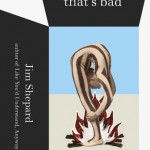By Emilie Tarrant
[Knopf: 2011]
The stories collected within You Think That’s Bad connect the distant past to the yet-experienced future in globetrotting style. The swagger of Jim Shepard’s opening lines pulled me in at once, and the book continues with a subtle grace. Each time I set the book down, it found its way quickly into my hands again. The style is engaging, but Shepard delivers much more than mere captivation.
His shorts are appealingly outlandish. They are epic. Shepard takes from history and history in the making, and the protagonists are beneficiaries of truth stranger than fiction. Culling from events including record-breaking mountaineers on a winter ascent and the ingenious special effects of Godzilla, the reader gets to lay modest claim to the awe-inspiring byway of our collective hero worship, myth-making, and shared tragedies.
The larger-than-life personae are cross-stitched with private lives of a terrestrial quality, placing the characters yet closer to our grasp. The career-minded passion depicted is at times fame making, at times life threatening, and it regularly blights families wanting stability and empathy. When the dueling adoration of siblings is requited for only one, mental tumult is counted, recounted, and mulled over again. A veteran spirals downward, and we witness his increasing societal estrangement as he throws himself into his own obsessive turmoil. Over the pages, a theme plays out of competing desire for companionship and independence.
Each such stitch of character development is crossed again, reminding us that relatable as they may be, this set of protagonists is undeniably extraordinary. And I do mean extra ordinary. But for one or two exceptions, their not-necessarily-paid professions are far from common. They confront the extremes of nature and accomplish impossible feats of fortitude. They conduct science in the presence of the Large Hadron Collider, and they acquire security clearances surpassing ho-hum Federal Bureau of Investigation agents. Still some, like those at the command of Gilles de Rais, highlight humanity’s dark side. These makers of history lift the collection from the mundane into the fantastic.
Among the tales are “Track Of The Assassins” and “The Netherlands Lives With Water,” the former of which chronicles a desert sojourn into the mountains of Persia. We follow Freya Stark as she follows her two guides, and a childhood copy of Marco Polo’s Travels, while she takes on the role of cartographer for the scantly traveled terrain. She opens the door for us as she treks through West Asia, the wellspring of lore that the Western world has long romanticized. It is with an eye to the Persian sect known as the Assassins, dating back to the earliest Crusades, that Freya pushes forward to locate their ruins at Alamut. A vanguard of European travel in the early twentieth century, she is also a vanguard of feminine identity as the only woman in You Think That’s Bad to narrate her own story.
Freya brings our attention to by-gone eras and “The Netherlands Lives With Water” swoops us to our future. Its characters include a physical geographer in the water sector and his wife, a media liaison for a climate mitigation and adaptation program. Climate change is knocking on their door. Underground garages doubling as drainage basins is one of many city engineering tricks to ply infrastructure with a dual function to ward against floods. Seas are rising, storms have multiplied, and it is all told with palpable detail. The constant threat as they scramble for new preservation tactics crescendos, and climate change is brought to human scale.
“Assassins” and “Netherlands” evoke themes of self-made destiny—personal as Freya embarks on her travels, and collective as the Dutch rein the forces of extreme weather.
Still more themes emerge, and an unavoidable one is war. “Track Of The Assassins,” with the distance of chronology, gives a cursory nod to the Crusades while heeding more the geography inhabited by the Assassins. “Minotaur,” with a September 11th orientation, maintains distance in the shadowy world of Department Of Defense contractors. Its protagonist shows himself to be incapable of anything more than emotional estrangement from his wife. His work transpires in remote and restricted regions of the American Southwest. His assigned projects are so secret he and his colleagues never know the full scope of their efforts. Isolation permeates every aspect of his being, and it echoes the isolation characteristic of the unmanned drones he develops.
In two other stories, the experience of war is much more immediate. Accounts given on behalf of Japanese at the mercy of firebombings and foot soldiers enduring jungle rot and odorous, bug-infested rations took my breath. They were terrifying.
The wartime narratives are not moralizing, nor propagandistic. They are told as a matter of course. They are humanizing. Many argue that art’s greatest achievement is to place us face to face with our humanity. These stories exemplify Jim Shepard’s mastery of such a lofty craft.
There are more things I can say of You Think That’s Bad. For instance, the stories emulsify the romantic and the scientific. Each narrative weaves the present tense with the past. And with his dynamic layering, Shepard works like a magician distracting us with the wave of a hand while revealing underpinnings of emotion, psyche, and aspiration with the wave of his other.
This post may contain affiliate links.









